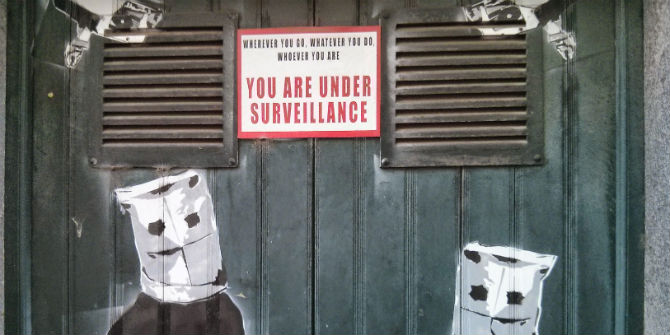Steven Barnett, Professor of Communications at the University of Westminster, explains why John Whittingdale’s announcement that the Government might not enact key provisions of the Leveson framework on press regulation – if pursued – would fatally undermine the historic cross-party agreement passed by Parliament. It would, he argues, be worse than the climbdown by John Major’s Government 20 years ago and proof of the continuing power of the British press.
Two years ago, as most of the UK’s national press were furiously denouncing plans for a new model of self-regulation based on the recommendations of the Leveson report, the Guardian’s Martin Kettle wrote a powerful piece about where power lies in British politics. Evoking the political mantra of the 1970s and 1980s, when trade unions vehemently resisted attempts to make them accountable, he posed the question that was repeatedly asked then: who governs?
That question, he said, was answered in respect of trade union reform: Parliament governs, through the law. But what about today? “Do the elected Government and Parliament govern? Or are we governed instead by those who also believe, as a matter of fundamental principle […] that the law should not apply to them?” There is, he said, “again a power outside Parliament whose power exceeds Parliament’s – the press.”
A new framework for self-regulation
In the following months, it looked as though he had been proved wrong. Even in the teeth of angry tub-thumping by fulminating editors, vicious denunciations in their columns, and absurd scaremongering about an end to “300 years of press freedom”, Parliament and Prime Minister David Cameron endorsed a historic cross-party agreement to implement the core recommendations of Leveson through a Royal Charter.
They were mild and moderate proposals, similar in concept to the structure agreed some time earlier for upholding standards in the law profession: self-regulation, but with a backstop body recognised in law to ensure that self-regulators were genuinely independent of the industry and genuinely effective. There were many similarities with the system operating in Ireland which the major English newspaper groups have joined (and which even allows politicians a more active role).
While editors shamelessly exploited their megaphones to abuse MPs and reformers, saner voices with decades of free speech credentials behind them were clear about the public interest benefits. Tom Stoppard, long-standing defender of unrestrained free speech, identified the schizophrenic nature of British journalism – part heroic St George journalism, part delinquent jackal journalism – and concluded: “There is only one question the MPs should be asking themselves: would a statute-backed monitor of the non-statutory independent regulating body be a constraint on St George?” Of course, the answer was no. Meanwhile Harry Evans, perhaps the most successful British campaigning editor of modern times, condemned the “staggering” misrepresentation of Leveson: “to portray his careful construct for statutory underpinning as state control is a gross distortion.”
Since then, the process has moved slowly but inexorably forward. A Press Recognition Panel (PRP) was established, following assiduously the Charter protocol for complete independence from political influence. The appointments process was transparent, the selection criteria clear, and the resultant panel members manifestly detached from government, politicians and the industry. Following wide and transparent consultation on the detailed recognition criteria, the PRP declared itself open to receive applications from self-regulators on 10 September 2015.
And while most newspaper publishers continued to denounce Parliament’s proposals and set up their own regulator IPSO in defiance, a new self-regulator Impress – the Independent Monitor for the Press – had established itself, also following the Leveson criteria for independence from both politicians and the industry. It announced that it would apply for recognition before the end of this year.
Incentives for recognition
But Leveson was clear on one further point: for recognition to be meaningful, there must be clear benefits for those publishers who join a recognised self-regulator. An incentives package with two key elements was therefore approved by Parliament as provisions in the 2013 Crime and Courts Act.
First, as of 3 November 2015 (one year after the PRP was established), members of a recognised self-regulator are protected from the risk of exemplary damages in libel and privacy cases. But the bar for imposition of these damages has (in accordance with the requirements of Article 10 of the Human Rights Act) been set extremely high. Damages cannot be awarded unless publishers have shown “a deliberate or reckless disregard of an outrageous nature for the claimant’s rights”. Such damages must be proportionate. This sanction only applies in the most extreme cases and is no serious handicap to those staying outside the recognition system.
Far more important – and at the heart of the new structure – is the provision for legal costs. For decades, multi million pound publishing corporations have intimidated those seeking redress for a newspaper’s wrongdoing with the threat – often overt – of potentially ruinous court costs. Now, a recognised self-regulator must provide a system of low-cost arbitration for aggrieved citizens seeking redress. If a newspaper chooses not to join a recognised self-regulator (as it is entitled to do) but forces those claimants to court, it must bear the court costs itself even if it wins the case.
This provision – denounced as a shocking affront to press freedom by the press – is based on simple principles of access to justice for ordinary people. It also, conversely, protects small publishers from wealthy and powerful litigants and therefore safeguards journalism which holds power to account. At a stroke, it removes the threat of huge legal bills presently faced by aggrieved citizens of average means, and by publishers who do not have deep pockets.
Without the court costs incentive, the whole recognition process painstakingly agreed by all three parties and by Parliament becomes virtually worthless. There is no downside for staying out of the recognition system, and little incentive to join it.
A Government wrecking move?
In a little understood procedural nicety, that provision – already enacted by Parliament – has to be “commenced” by the Secretary of State to come into force. And in an astonishing act of apparent political sabotage, the Culture Secretary John Whittingdale announced at the Society of Editors conference on Monday that he was “minded” to delay enacting it. Thus it appears that a single minister can unilaterally undermine the will of Parliament. According to Press Gazette, “there was a palpable sense of relief in the room” following his announcement.
Of course there was. Veterans of these debates will remember a similar atmosphere in the aftermath of the second Calcutt report in 1993 which – following the manifest weaknesses of the Press Complaints Commission established in 1991 – recommended a statutory press tribunal. The press screamed foul, state repression, and the end of 300 years of press freedom. An embattled government with a slim majority capitulated in the face of a wholly predictable press onslaught, and the opportunity was gone. Within ten years, phone hacking, abuses, and serial violations of the editors’ code had become endemic.
And here we are again: a Prime Minister with a slim and unexpected majority following a ferocious assault by the same newspapers against his political opponents, widely acknowledged to have helped win him his second term. Is this payback time?
We have yet to see exactly how “minded” Whittingdale is and how firm this apparent retraction. Astonishingly, he seemed to suggest that further action might depend on whether the newspapers allow IPSO a slightly looser rein than the stranglehold they currently exert. The Government, he says, “will continue to monitor IPSO”. Where now is the fury and rhetoric of endangered freedoms in the face of a deliberate intervention by a cabinet minister, no less, apparently telling the press how to run their regulator? Perhaps editors are too busy celebrating.
If it does indeed transpire that Whittingdale and Cameron are unilaterally pulling the plug on a fundamental plank of a democratically agreed policy, this would be much, much worse than the Major Government’s failure to implement Calcutt 20 years ago. Cameron gave his word to the victims of press abuse that he would implement Leveson if it wasn’t “bonkers”. He supported the Charter and associated framework in Parliament, and was part of a historic cross-party agreement that saw the framework into law. It would be an almost unparalleled act of political cowardice and a spectacular capitulation to press power. If it happens, we will truly know the answer to Martin Kettle’s question: the press governs. And this Prime Minister would go down as the most craven, opportunistic and spineless political leader in modern political history.
This article gives the views of the author and does not represent the position of the LSE Media Policy Project blog, nor of the London School of Economics and Political Science.







1 Comments